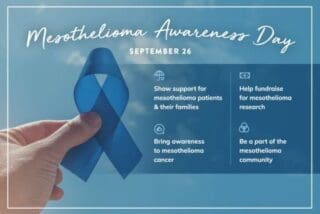
Memorial Day is a federal holiday dedicated to those who lost their lives during their military service. On this day, service members and civilians remember and honor fallen soldiers’ bravery and sacrifice.
Memorial Day is a somber day. It is marked with national ceremonies and reverently decorated gravesites. Memorial Day is near other military holidays, such as Armed Forces Day (the third Saturday of May). Remembrance is one way of honoring veterans and their loved ones.
People can help make a difference in servicemembers’ lives by engaging in advocacy around veterans’ health issues. Many veterans were exposed to asbestos in the line of duty, unaware of its dangers.
Exposure to asbestos may lead to asbestos-related cancer diagnoses like mesothelioma – even decades later. Catching and treating mesothelioma early is associated with better patient outcomes. Veterans who know or suspect exposure should talk to a doctor.
The History of Memorial Day
Memorial Day began more than 150 years ago, honoring soldiers who died in the Civil War. It was first observed on May 30, 1868, and was called Decoration Day at the time. Today, the namesake tradition continues by decorating the gravesites of fallen soldiers.
Memorial Day falls on the last Monday of May. Each year, members of the Old Guard place a small American flag on each grave at Arlington National Cemetery. The President or Vice President lays a wreath at the Tomb of the Unknown Soldier.
Military personnel, veterans, friends and families lovingly decorate gravesites of those who have passed. Because it is a national holiday, many people have the day off from work. There are memorials, gatherings and barbecues throughout the country.
Remembrance matters for those who lost their lives in service and for those who continue to battle health issues today.
The History of Asbestos Use in the Military
Asbestos is a mineral that was popular for its fire resistance and durability. For decades, the military used asbestos-containing products and materials in barracks, bases, equipment, gear and weapons.
Throughout most of the 20th century, the Navy used asbestos in many ships and submarines to prevent deaths by fire. Many service members handled these products during typical military activities. Asbestos exposure can later lead to the development of mesothelioma and other conditions.
By the 1970s, evidence about the negative health impacts of asbestos exposure was growing. Researchers linked asbestos exposure to various conditions, such as mesothelioma and asbestosis. As a result, the United States began regulating asbestos in the late 1970s.
Despite regulations, reports of asbestos exposure continue to emerge. In 2021, the military was the most commonly reported category of asbestos exposure. More than 30% of Americans diagnosed with mesothelioma are veterans. Due to mesothelioma’s latency period, individuals may not see symptoms for up to 50 years. As a result, many veterans are still at risk of developing mesothelioma.
What Options Do Veterans With Mesothelioma Have?
Raising awareness about mesothelioma may help some veterans recognize symptoms sooner. This may lead to an earlier diagnosis and more options for a mesothelioma treatment plan. Veterans diagnosed with mesothelioma may have various treatment and legal resources available. Some of these resources are through the Department of Veterans Affairs (VA).
Mesothelioma patients can find specialized, quality care at cancer centers throughout the country. Some centers have mesothelioma doctors with experience treating this type of cancer. Patients may also contact the VA to get more information about VA medical center options.
Veterans diagnosed with mesothelioma may qualify for monthly VA benefits. This financial compensation may help cover medical expenses and lost wages. Experienced mesothelioma lawyers understand which legislation may impact asbestos victims. Mesothelioma lawyers can explain legal options available to veterans with mesothelioma.
On Memorial Day, Americans honor the soldiers who lost their lives in service. But surviving veterans may still face a mesothelioma diagnosis as a result of asbestos exposure during their service. Awareness and support can help these veterans receive the information and care they deserve.




